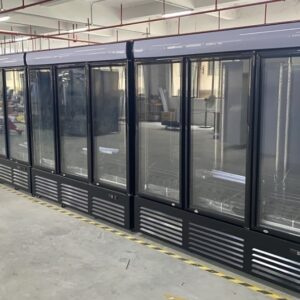When running a successful supermarket, one of the most crucial aspects of ensuring the business remains operational is the proper storage and display of food. Supermarket refrigeration equipment plays an essential role in maintaining product quality, reducing waste, and ensuring food safety. Whether you’re selling fresh produce, dairy products, or frozen foods, having the right refrigeration equipment is vital for both the health of your customers and the success of your business.
1. Maintaining Food Freshness and Quality
The primary function of supermarket refrigeration equipment is to preserve the freshness and quality of perishable items. Without proper refrigeration, many food items such as meat, dairy, and produce can spoil quickly, leading to waste and potential health hazards. Modern refrigeration systems are designed to maintain the optimal temperature for a wide range of products, ensuring they stay fresh and safe for consumption.
For supermarkets, refrigeration goes beyond just keeping food cool. Advanced units can help maintain the exact conditions required for various products, preventing temperature fluctuations that can lead to degradation or the growth of harmful bacteria. For example, different sections of a supermarket, like the dairy section, meat department, or frozen food aisles, may need specialized refrigeration equipment to maintain ideal temperatures.
2. Energy Efficiency and Cost Savings
Energy consumption is a significant concern for supermarkets due to the large amounts of refrigeration required. Choosing energy-efficient supermarket refrigeration equipment is not only beneficial for the environment but also for your bottom line. Newer refrigeration models are designed to be much more energy-efficient than older ones, saving money on electricity bills and reducing your carbon footprint.
Energy-efficient units also come with features like advanced insulation, optimized compressors, and more efficient cooling mechanisms, all of which help to lower the amount of energy needed to keep your food at the correct temperature. By investing in energy-efficient refrigeration systems, food retailers can offset the higher upfront costs through long-term savings.
3. Regulatory Compliance and Food Safety
Food safety is a top priority in any supermarket. Food retailers must comply with local health and safety regulations, which often include maintaining specific temperature ranges for different types of food. Failure to meet these standards can lead to health risks for customers and significant fines for the business.
Supermarket refrigeration equipment is built with features that help you stay compliant with regulations by maintaining consistent temperatures, providing alarms in case of malfunctions, and offering easy-to-read temperature monitoring systems. Some modern refrigeration systems also come with data logging capabilities, so supermarkets can keep accurate records for health inspections or audits.
4. Improved Product Display and Customer Experience
In addition to preserving food, supermarket refrigeration equipment is also designed to showcase products attractively and conveniently. Many refrigeration units are now built with sleek designs that enhance the overall shopping experience. For example, display freezers and refrigerators allow customers to see products clearly without needing to open doors, keeping the cold air inside and reducing energy consumption.
Open-front display cases are particularly popular in fresh food aisles, offering customers easy access to refrigerated items like salads, beverages, and deli products. Well-organized refrigeration not only encourages impulse buys but also helps customers make quicker decisions by giving them a clear view of available products.
5. Reducing Food Waste
One of the unfortunate byproducts of poor refrigeration is food waste. If perishable items are not stored at the correct temperature, they may spoil prematurely, leading to lost profits. By investing in high-quality supermarket refrigeration equipment, food retailers can dramatically reduce the risk of food spoilage.
Additionally, more advanced refrigeration units now come with features such as defrost cycles and automatic temperature regulation, further reducing the chance of food waste due to equipment failure. With proper care and maintenance, supermarket refrigeration equipment can significantly extend the shelf life of perishable goods, reducing overall waste and maximizing profitability.
Conclusion
The importance of supermarket refrigeration equipment cannot be overstated. Whether you are running a large supermarket or a small grocery store, having reliable, energy-efficient refrigeration is essential to keeping food fresh, reducing waste, ensuring food safety, and enhancing the customer experience. Investing in high-quality supermarket refrigeration equipment can lead to long-term savings, improved food safety, and a better shopping experience for your customers.
For all your refrigeration needs, Shopfitting Depot offers a wide selection of high-quality supermarket refrigeration equipment designed to meet the demands of food retailers. Explore our range today and find the perfect solution for your store.

